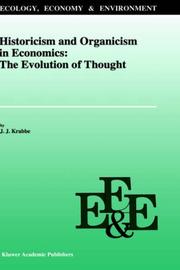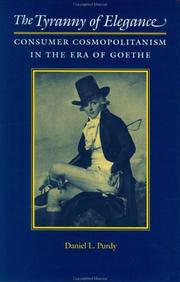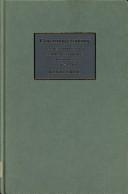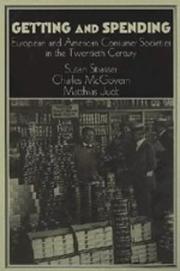| Listing 1 - 10 of 11 | << page >> |
Sort by
|

ISBN: 0792340434 Year: 1996 Publisher: Dordrecht, The Netherlands Boston Kluwer Academic
Abstract | Keywords | Export | Availability | Bookmark
 Loading...
Loading...Choose an application
- Reference Manager
- EndNote
- RefWorks (Direct export to RefWorks)
Digital
Year: 1835 Publisher: Heidelberg Druck und Verlag von K. Groos
Abstract | Keywords | Export | Availability | Bookmark
 Loading...
Loading...Choose an application
- Reference Manager
- EndNote
- RefWorks (Direct export to RefWorks)
Digital
Year: 1816 Publisher: Tübingen C.F. Osiander
Abstract | Keywords | Export | Availability | Bookmark
 Loading...
Loading...Choose an application
- Reference Manager
- EndNote
- RefWorks (Direct export to RefWorks)

ISBN: 0801858747 Year: 1998 Publisher: Baltimore, Md London The Johns Hopkins University Press
Abstract | Keywords | Export | Availability | Bookmark
 Loading...
Loading...Choose an application
- Reference Manager
- EndNote
- RefWorks (Direct export to RefWorks)

ISBN: 0521303168 9780521303163 Year: 1988 Publisher: Cambridge: Cambridge university press,
Abstract | Keywords | Export | Availability | Bookmark
 Loading...
Loading...Choose an application
- Reference Manager
- EndNote
- RefWorks (Direct export to RefWorks)
History of Germany and Austria --- anno 1700-1799 --- anno 1800-1899 --- Economics --- Mercantile system --- Economie politique --- Mercantilisme --- History --- Histoire --- History. --- Economics - Germany - History. --- Mercantile system - Germany - History.
Book
ISBN: 0197607802 0197607837 0197607810 0197607829 9780197607800 Year: 2021 Publisher: New York: Oxford university press,
Abstract | Keywords | Export | Availability | Bookmark
 Loading...
Loading...Choose an application
- Reference Manager
- EndNote
- RefWorks (Direct export to RefWorks)
"Today, ordoliberalism is at the centre of the ongoing debate about the foundations, the present governance and future prospects of the European Union-and yet we do not dispose of a comprehensive definition of it. Whenever we talk of the dominance of the German model, the discussion should involve a detailed picture of ordoliberal principles. This book retraces the intellectual history of ordoliberalism, focusing in particular on the works of its main representatives Walter Eucken and Wilhelm Röpke, together with references to the contributions of Franz Böhm, Alexander Rüstow, Leonhard Miksch and Friedrich Lutz. The book highlights the crucial, albeit overlooked, role of economic and political power in the making of ordoliberal thought. More precisely, the book shows that ordoliberalism, in its ideological, epistemological, theoretical and political components, can be defined as a political economy of power, i.e. a form of economic knowledge, whose primary objective is to analyse the sources, the action and the impact of power within society. By doing so the book will offer a new perspective on ordoliberals' key concepts built in the inter-war, while contextualizing them within a broader intellectual project"--
Economic policy --- Economics --- Historical school of economics. --- Power (Social sciences) --- Philosophy. --- History --- Economic nationalism --- Economic planning --- National planning --- State planning --- Planning --- National security --- Social policy --- Economics - Germany - History - 20th century --- Historical school of economics --- Economic policy.

ISSN: 00694290 ISBN: 271322070X 9782713220708 Year: 2005 Volume: 122 Publisher: Paris: École des hautes études en sciences sociales,
Abstract | Keywords | Export | Availability | Bookmark
 Loading...
Loading...Choose an application
- Reference Manager
- EndNote
- RefWorks (Direct export to RefWorks)
Economics --- Economic policy --- Power (Social sciences) --- Institutional economics --- Economie politique --- Economie politique et politique --- Politique économique --- Pouvoir (Sciences sociales) --- Institutionnalisme --- History --- Political aspects --- History. --- Histoire --- Economic aspects --- Political economics --- Historical study --- Germany --- 18th-19th centuries --- Political aspects. --- 18th-19th centuries. --- Politique économique --- Empowerment (Social sciences) --- Political power --- Exchange theory (Sociology) --- Political science --- Social sciences --- Sociology --- Consensus (Social sciences) --- Economic theory --- Political economy --- Economic man --- Economic nationalism --- Economic planning --- National planning --- State planning --- Planning --- National security --- Social policy --- Economics - Germany - History - 18th century --- Economics - Germany - History - 19th century --- Economics - Political aspects - Germany --- Economic policy - Political aspects --- Power (Social sciences) - Economic aspects - Germany --- Institutional economics - History --- Espace (économie politique) --- Allemagne --- 18e siècle

ISBN: 0521626943 0521622379 1139052632 Year: 1998 Volume: *6 Publisher: Cambridge, England New York Melbourne Washington Cambridge University Press German Historical Institute
Abstract | Keywords | Export | Availability | Bookmark
 Loading...
Loading...Choose an application
- Reference Manager
- EndNote
- RefWorks (Direct export to RefWorks)
The developing history of consumption is not so much a separate field, as a prism through which many aspects of social and political life may be viewed. The essays in this collection represent a variety of approaches in Europe and America; yet their commonalities suggest recent directions in the scholarship, raising such themes as consumption and democracy, the development of a global economy, the role of the state, the centrality of consumption to Cold War politics, the importance of the Second World War as a historical divide, the language of consumption, the contexts of locality, race, ethnicity, gender, and class, and the environmental consequences of twentieth-century consumer society. Implicitly, and sometimes explicitly, they explore the role of the historian as social, political, and moral critic. The essays discuss products, corporate strategies, government policies, and ideas about consumption. Unlike other studies of twentieth-century consumption, this book provides international comparisons.
Consumption (Economics) --- Material culture --- Culture --- Folklore --- Technology --- Consumer demand --- Consumer spending --- Consumerism --- Spending, Consumer --- Demand (Economic theory) --- History --- United States --- 20th century --- Europe --- Germany --- Consumption (Economics) - Europe - History - 20th century. --- Consumption (Economics) - Germany - History - 20th century. --- Material culture - United States - History - 20th century. --- Material culture - Europe - History - 20th century. --- Material culture - Germany - History - 20th century. --- Arts and Humanities
Book
ISBN: 1501700111 0801452864 150170012X 9781501700125 9780801452864 9781501700118 Year: 2015 Publisher: Ithaca
Abstract | Keywords | Export | Availability | Bookmark
 Loading...
Loading...Choose an application
- Reference Manager
- EndNote
- RefWorks (Direct export to RefWorks)
Department stores in Germany, like their predecessors in France, Britain, and the United States, generated great excitement when they appeared at the end of the nineteenth century. Their sumptuous displays, abundant products, architectural innovations, and prodigious scale inspired widespread fascination and even awe; at the same time, however, many Germans also greeted the rise of the department store with considerable unease. In The Consuming Temple, Paul Lerner explores the complex German reaction to department stores and the widespread belief that they posed hidden dangers both to the individuals, especially women, who frequented them and to the nation as a whole.Drawing on fiction, political propaganda, commercial archives, visual culture, and economic writings, Lerner provides multiple perspectives on the department store, placing it in architectural, gender-historical, commercial, and psychiatric contexts. Noting that Jewish entrepreneurs founded most German department stores, he argues that Jews and "Jewishness" stood at the center of the consumer culture debate from the 1880s, when the stores first appeared, through the latter 1930s, when they were "Aryanized" by the Nazis. German responses to consumer culture and the Jewish question were deeply interwoven, and the "Jewish department store," framed as an alternative and threatening secular temple, a shrine to commerce and greed, was held responsible for fundamental changes that transformed urban experience and challenged national traditions in Germany's turbulent twentieth century.
Consumer behavior -- Germany -- History. --- Consumption (Economics) -- Germany -- History. --- Department stores -- Germany -- History. --- Jews -- Germany -- Social conditions -- 19th century. --- Jews -- Germany -- Social conditions -- 20th century. --- Consumption (Economics) --- Consumer behavior --- Department stores --- Jews --- Business & Economics --- Economic History --- Hebrews --- Israelites --- Jewish people --- Jewry --- Judaic people --- Judaists --- Ethnology --- Religious adherents --- Semites --- Judaism --- Stores, Department --- Stores, Retail --- Behavior, Consumer --- Buyer behavior --- Decision making, Consumer --- Human behavior --- Consumer profiling --- Market surveys --- Consumer demand --- Consumer spending --- Consumerism --- Spending, Consumer --- Demand (Economic theory) --- History --- Social conditions --- E-books --- History.
Book
ISBN: 9782717854497 2717854495 Year: 2009 Publisher: Paris: Economica,
Abstract | Keywords | Export | Availability | Bookmark
 Loading...
Loading...Choose an application
- Reference Manager
- EndNote
- RefWorks (Direct export to RefWorks)
Après 1945, la pensée économique allemande a disparu de l'horizon intellectuel, y compris en Allemagne, comme si l'histoire politique du IIIe Reich imposait de tourner le dos à des traditions dont certains rejetons s'étaient fourvoyés dans les totalitarismes. Culturellement, la pensée économique allemande est pourtant bien enracinée depuis le caméralisme du XVIIIe siècle, en passant par l'économie politique allemande du XIXe siècle et en allant jusqu'à l'économie sociale de marché. L'ouvrage reprend des éléments de compréhension qui permettent d 'éviter trop d'approximations dans les comptes rendus habituels de ces oppositions. La pensée économique allemande référencée ici va de Hegel à Eucken. La réflexion sur les méthodes occupe une place de choix dans la pensée économique allemande qui provient sans doute de l'importance de la réflexion philosophique et notamment de la réflexion sur l'histoire. Elle est surtout plus " politique " et insiste sur la relation entre Territoire-Economie et Etat(s)-Justice sociale. De quoi relever les défis de la globalisation et éclairer la manière dont l'Allemagne a construit son rapport au monde du XXIe siècle.
Economic schools --- Economists --- Economics --- Economistes --- Economie politique --- History --- Histoire --- German economics --- Thought --- 19th-20th centuries --- AA / International- internationaal --- DE / Germany - Duitsland - Allemagne --- 330.40 --- 331.100 --- 330.08 --- Geschiedenis van het economisch en sociaal denken --- Evolution historique de la pensée économique et sociale: généralités --- History of the economic and social thinking --- 330.40 Geschiedenis van het economisch en sociaal denken --- 330.40 Evolution historique de la pensée économique et sociale: généralités --- 330.40 History of the economic and social thinking --- Geschiedenis van het economisch en sociaal denken. --- Economische geschiedenis: algemeenheden. --- Economisten. --- Economisten --- Economische geschiedenis: algemeenheden --- Economics - Germany - History --- Économistes allemands --- Économie politique --- Histoire.
| Listing 1 - 10 of 11 | << page >> |
Sort by
|

 Search
Search Feedback
Feedback About UniCat
About UniCat  Help
Help News
News